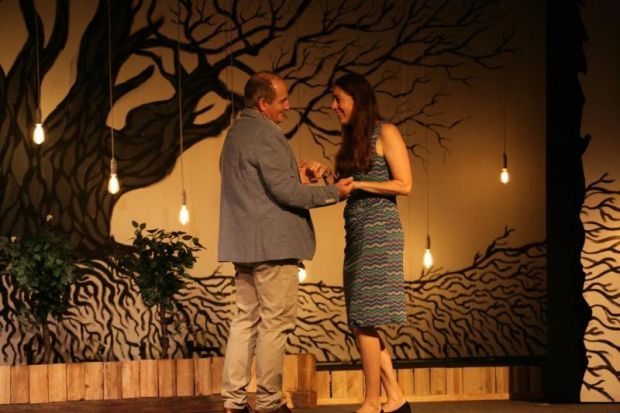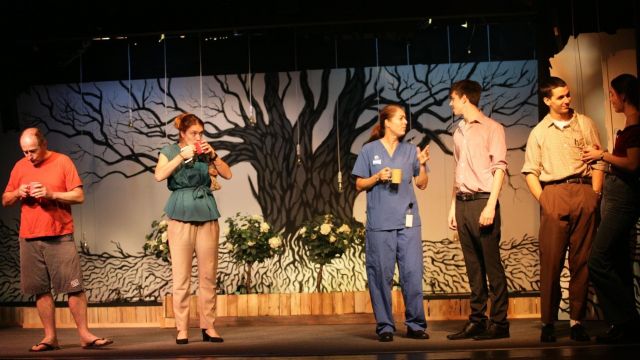Things I Know to be True
Things I Know to be True is a play about a family. An ordinary Australian family. It’s set in a suburb of Adelaide – but it could be in any suburb in any Australian city. Playwright Andrew Bovell understands ‘family’ – as did the actors with whom he worked as the idea for this play grew and flourished. They understood about parents. How they work hard to support their kids, how they want them to succeed. They also knew about kids. How they try to be what their parents want; how they need to be true to themselves as well. They knew about secrets. The hurt that they can cause … but the need, sometimes to brave that hurt.
Bovell has captured all this in this beautiful play. Director Carla Moore describes it as “compassionate, tender … funny at times but also deeply moving”. She has chosen, in her production, to let it speak for itself. The play is realist. But Moore decided against a realist set. Rather she uses an empty stage framed by a lofty surrealist tree, its bare branches reaching into a clear sky, its myriad roots burrowing down, then encompassing the stage like the threads that connect a family and tie them tightly. Surreal too are the roses that symbolise the seasons in the year in which the play is set.

The Price family, however, is very real. Bob and Fran Price have worked hard all their lives, Bob in the automotive industry, Fran as a nurse. Bob took retrenchment when the manufacturing industry began to fold. Fran is still working at the local hospital. Their three eldest children have left home but they keep them close. Pippa is married with two kids. Bob picks them up after school. Mark lives alone after a long relationship ended unexpectedly. Ben works in a bank. Their youngest child, Rosie is on a ‘gap year’ in Europe.
It is her unexpected return that upsets the equilibrium in what appears to be happy, ordinary family.
Bob Price is played by Ian Boland, who finds the steadfastness of a man who has worked hard, paid his way, is loyal and supportive – but who is finding early retirement a little depressing. “Sometimes I find myself in the shed wondering what to do next,” he says. Boland’s Bob is down to earth, straight, trusting – and is ‘floored’ when that trust is betrayed.

Fran Price is more complex, and Julie Moore realises the multifaceted dimensions of the wife/mother/carer that Bovell created in Fran. Moore is a perceptive performer who portrays the drive that keeps pushing Fran through years of hard work … and disappointments. She is the backbone of the family and will support Bob and her kids in any way – but that burden that has worn her down and left her a little prickly. It would be easy to make this character too hard, but Moore shows the fraility under the surface.
Freya Moore takes on a major role as Rosie. It is Rosie who introduces the family in a long monologue – and Moore carries this task ably, finding the delicate humour in the lines as well as the emotional turmoil she describes to the audience. Because she is the catalyst to much of the action, Rosie spends a great deal of the play on stage, watching and listening, and Moore does both well. Her love for her family is clear in her reactions, her expressions – and the growth that she makes over the play’s year.

Georgia Britt is Pippa, the eldest child, a teacher, a working mum, who’s a little jaded with life – just like Fran, with whom she has a love-hate relationship. Britt finds both the strength and bitterness written into Pippa’s character, and how they have affected her relationships with the other members of the family, and the decisions she feels compelled to make.
Jordan Andrews plays Ben. Brash, ambitious, Fran’s favourite, Ben is an enigma in the family – and Andrews shows his pushy self-confidence, his brassy arrogance – and the brittleness that runs beneath.

Giani Leon is Mark, who sees himself as the black sheep of the family – something no one else realises. This is a difficult role and Leon finds the intensity – and anguish – of the character in a performance that is touching and moving.
Things I know to be True is about the things family members don’t necessarily know to be true … about each other, about how they will react when they find out, and about what will bring them together. It is, as I said, beautiful play. Carla Moore and her cast have uncovered all of its nuances and the delicate complexities of its characters.
Carol Wimmer

Subscribe to our E-Newsletter, buy our latest print edition or find a Performing Arts book at Book Nook.

